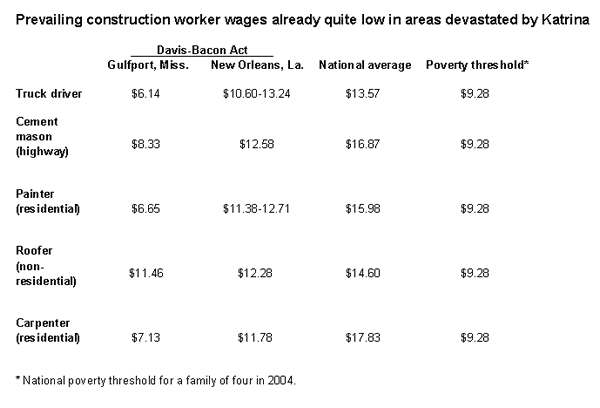See Snapshots Archive.
Snapshot for September 28, 2005.
Gulf families’ recovery at risk
On September 8, President Bush suspended indefinitely the operation of the Davis-Bacon Act in every county touched by Hurricane Katrina—even Miami, Fla. The law requires that federal construction contractors pay no less than the prevailing wage for each construction occupation in the local area where the work is done. By suspending the law, the president gave contractors permission to cut the pay of construction workers below the levels that prevailed before Katrina hit the area.
Ranking both private-sector average weekly wages and average annual pay in the construction industry, Mississippi already has the lowest paid construction workers in the country and Louisiana has the 15th lowest paid. As a result, the construction wage rates required by the Davis-Bacon Act in Louisiana and Mississippi are generally quite low when compared with construction wages around the country (see the table below). In some cases, they are not enough to keep a typical family out of poverty.

For example, truck drivers doing highway construction in Gulfport, Miss. who earn the Davis-Bacon wage rate of $6.14 an hour earn less than the poverty threshold for a family of three1 , even if they work full-time, 52 weeks a year. The Davis-Bacon rate in New Orleans ranges from $10.60 to $13.24 an hour, depending on the kind of truck being driven. The average hourly wage for industrial truck drivers nationwide is $13.57.
The Davis-Bacon wage rates vary by locality, occupation, and type of construction (heavy, highway, building, or residential). For example, the Davis-Bacon hourly rate for cement masons in New Orleans was $12.88 for building construction and $12.58 for highways. In Gulfport, the Davis-Bacon rate was $11.82 an hour for building construction and only $8.33 for highways—which would leave a full-time, full-year mason with $2,000 less per year than the poverty threshold for a family of four.2 Nationally, the average hourly wage for cement masons in highway construction in May 2004 was $16.87 and $16.14 in non-residential building.
For a roofer doing non-residential building construction, the Davis-Bacon wage rate in Gulfport is $11.46 an hour, plus $0.91 in fringes, and $12.28 an hour in New Orleans. The national average hourly rate was $14.60 in May 2004.
For residential housing painters, the Davis-Bacon rate is $6.65 in Gulfport and $11.38-$12.71, plus less than $1.00 in fringes, in New Orleans. Nationally, residential painters averaged $15.98 an hour in May 2004.
It is difficult to find a Davis-Bacon rate anywhere in Louisiana and Mississippi that is not lower than the national average for that occupation and type of construction. Electricians doing non-residential building construction are a rare exception. Their national average hourly rate was $20.82 in May 2004. The Davis-Bacon wage rate is $19.60 an hour in Gulfport and $22.09 in New Orleans plus fringe benefits.
In light of the damage done to the Gulf Coast and the lives of its inhabitants, the president’s action, by allowing wages to fall below the average levels that prevailed before the storm, is precisely the opposite of what’s needed. Suspension of the Davis-Bacon Act will harm the very communities and workers whose lives the president says he wants to lift up and whose futures depend on fair compensation.
This week’s Snapshot was written by EPI vice president and policy director Ross Eisenbrey.
Notes:
1. The 2004 poverty threshold for a family of three is $15,071. Assuming 2080 hours of work, an hourly rate of $7.25 would be required to meet the poverty guideline. EPI research suggests, however, that a better measure of an adequate income is twice the poverty guideline, $15.48 on an hourly basis. See Bernstein, Jared. 2001. Let the War on the Poverty Line Commence. Working Paper Series. New York, N.Y.: The Foundation for Child Development.
2. The 2004 poverty threshold for a family of four is $19,311, or $9.28 an hour, assuming 2080 hours of work in a year.
